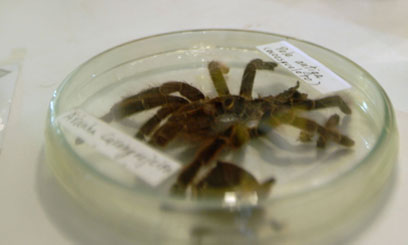The Sackier Institute for Comparative Genomics of the American Museums of Natural History pledged to support KWS plans to construct the state-of-the-art laboratory in Nairobi.
George Amato, the Institute’s director, also pledged to support training, collaborative research, exchange programmes and equipment for the laboratory.
He was speaking at the weekend during a luncheon hosted in honour of a KWS delegation to the US.
The KWS director, Julius Kipng’etich, is leading a delegation of KWS officers to develop partnerships to support the Kenya Wildlife Service Fund as well as raise funds for the planned forensic laboratory to be set up at KWS headquarters in Nairobi.
Once complete, the forensics and molecular biology laboratory is expected to enhance studies in population genetics and reduce poaching activities by providing credible prosecutorial evidence in court. The forensic laboratory will be a state-of-the-art facility and a regional referral centre for molecular diagnostics of wildlife-related crimes.
The KWS delegation is also lobbying US-based wildlife conservation groups and the US Congress on Kenya’s position at the forthcoming Convention on International Trade in Endangered Species of Wild Fauna and Flora (CITES) in Bangkok, Thailand.
Amato noted that KWS had made significant achievements in the last eight years and was proud to partner with it.
In appreciation, the KWS Director noted increased partnership between Kenya and the US, especially with the Institute, had increased tremendously as KWS was keen on using science-based decision making in management.
Kipng’etich also underscored the need for Kenya to be able to prove cases of bush meat trade and identifying contraband wildlife products at the airports and other ports of entry and trace their countries of origin.
The Sackier Institute for Comparative Genomics is the premier American research centre for wildlife conservation genetics, molecular ecology, wildlife forensics, small population biology and training of graduate student. It also holds the world’s largest frozen tissue depository centre.
A number of US-based business executives pledged to support the Kenya Wildlife Service Endowment Fund by becoming its ambassadors.
Michael Emmerman, the managing director of Newbewrger Berman LLC, a major finance and investing company, pledged to support the fund.
Other pledges came from Drew Kellerman Deutscher Bank – African investments, Tom Mims, the CEO of Emerging Africa and Bonnie Wiper, the President of Thinking Animals.
Earlier, the KWS delegation met Paul Tudor Jones, the CEO of Tudor Investments, who also made a commitment to support wildlife conservation in the Northern Kenya.
The KWS Director is accompanied by senior KWS officers and Bill Clark, who is coordinating the visit.











































